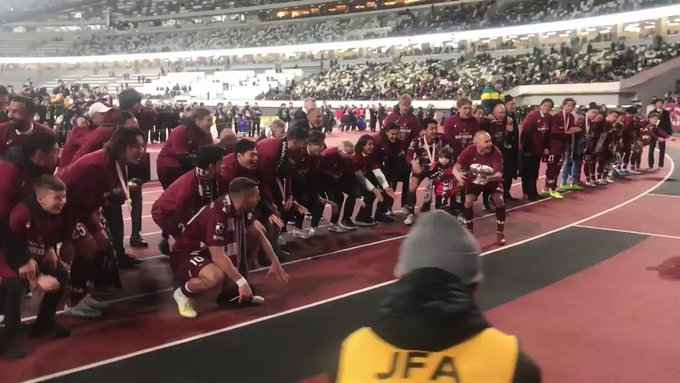Former Bayern Munich midfielder Thorsten Fink won it all as a player, now he finds himself coaching Andres Iniesta at Japanese side Vissel Kobe. He told DW about adapting to life in Japan and the impact of coronavirus.
Winning is not a foreign concept to Thorsten Fink. The 52-year-old won four Bundesliga titles, three German Cups and the 2001 Champions League while playing for Bayern Munich, before embarking on a nomadic coaching career that has eventually led him to Vissel Kobe in Japan.
Despite the chaos of moving to another country on another continent and working in another language that is not his own, Fink jumped right in when he became the Cows' third coach in two months back in June 2019.
The team were living up to their nickname at the time; just standing around, waiting for the slaughter. He had to take players who were used to winning trophies, including names like Lukas Podolski, David Villa, Andres Iniesta and Thomas Vermaelen, and get them to focus on staying up. There was no time for culture shock, no time to panic, no time to turn back.
First cup triumph
A late season surge saw Kobe escape the relegation battle to finish midtable and Fink masterminded a run to the final of the Emperor's Cup [Japan's domestic cup competition], where the club picked up the first trophy in their history in Villa's final professional match. Podolski has also since left the club.
“You've got to win that first title and then perhaps the second will follow, that's often the way. It's the same in life. You have to overcome one hurdle before you can reach the next,” the German coach told DW after the win at the start of 2020.
Despite his early success, which was followed by the Japanese Super Cup in February, Fink has found Japanese football a different challenge to Europe, where he'd enjoyed a mixed coaching career with clubs including Basel, Hamburg, and Austria Vienna.
The Dortmund-born coach, who will take his club in to the Asian Champions League, said the game was much faster in this part of the world than in in his native continent. But that wasn't the only challenge.
Learning the lingo
Fink spoke hardly any Japanese when he arrived, and still only knows basic phrases like arigatou (thank you) and konbanwa (good evening). But he explained that the people in his new home have been incredibly helpful throughout his time in the port city, particularly when he left money in an ATM.
“The man behind me told me I forgot my money in the machine and handed me my money. That doesn’t happen in Germany or Europe. The people here are so honorable, I could leave my bicycle without a lock,” he said of his new countrymen.
But, of course, the outlook isn't all rosy. Soon after the Emperor’s Cup victory, news started to break that the coronavirus was spreading like wildfire in nearby China. Masks, which were already a common sight in the country, became more prominent. They were distributed, and on full display, at the Japanese Super Cup. Hand sanitizer pumps were available to tens of thousands packed in to a stadium that once hosted a World Cup semifinal.
They knew the Coronavirus was coming.
This is not the first time that Vissel Kobe has gone through hardship. The club was supposed to start training for the first time under that name when the Great Hanshin Earthquake killed thousands of their neighbors in 1995. But they pushed on and became a symbol of hope for the city that was so badly hurt.
Challenging times
But the Coronavirus is different. There is no great physical rumble. It picks its victims and kills them on the inside, in much slower and merciless fashion than a strong earthquake. The J.League was suspended after its first match day but Fink was initially hoping to get back to the pitch quickly to prove the team was worthy of the title.
The league is supposed to return on April 3, but Fink isn’t certain that’s going to happen. In the meantime, he has kept his team busy with training and keeping their spirits up for the rest of the season, whenever that may come.
And as for this year’s Summer Olympics in Tokyo, slated to start in July, he’s even less optimistic that they will take place.
“I don’t believe (it will happen) but I hope it will. I don’t know, no one really knows.”













Nenhum comentário:
Postar um comentário